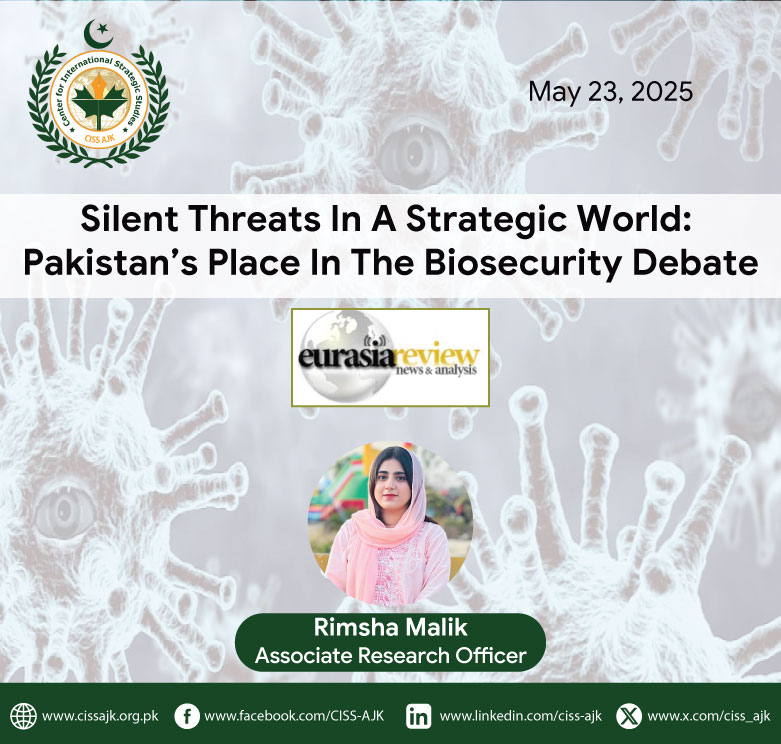It won’t come with the brightness of detonation or the sound of a rocket. No sirens, no war rooms. Just a quiet breath in a busy market. A border town fever. A laboratory mutation. And in a matter of weeks, the planet changes— the economy stagnates, cities are locked down, and hospitals run over. This is not fantasy. Modern face of invisible war is biological dangers that can destroy countries without a shot fired. The true threat might be microbiological, not military, in a world fixated on missiles and megatons. On this high-stakes strategic chessboard, Pakistan—a nuclear-capable, strategically located country—is not only susceptible to developing bio threats but also ideally positioned to influence world biosecurity standards.
Even the most military countries were brought to their knees by the COVID-19 epidemic as global powers have strengthened themselves with nuclear weapons. With its $877 billion defense spending, the United States recorded more than 1.1 million deaths. A nuclear neighbor, India battled oxygen shortages, mass cremations, and a near-collapse of its healthcare system. China’s rigorous containment policy sent off worldwide economic waves. These failures were not of military readiness but of biosecurity—the strategic blind spot of the twenty-first century.
The Global Health Security Index 2023 shows no nation scored above 75 out of 100 in biosecurity readiness, indicating a worldwide deficit. Ranking 130th among 195 countries on the same list, Pakistan said that although its nuclear command and control system is robust, its capacity to identify, react to, and contain biological hazards is still lacking. This disparity is especially concerning in a location like South Asia—a densely populated, climate-sensitive, and geopolitically dangerous zone where the consequences of a biosecurity failure may be disastrous.
Having signed the Biological Weapons Convention (BWC) in 1974, Pakistan has officially vowed to never create or employ biological weapons. The increasing danger is posed by dual-use biotechnology—scientific research that can be applied for both lawful and harmful ends. Now available to non-state actors with little infrastructure are technologies, including artificial DNA synthesis, synthetic virology, and CRISPR gene editing. The World Economic Forum drew attention in 2021 to the growing availability of such instruments as a “top 10 global risk,” similar to climate change and cyber warfare.
Disarmament, the prevention of the spread of weapons and making sure biological sciences are used peacefully are all still core principles in Pakistan’s Biological Weapons Convention policy. Being a party to the Convention for some time, Pakistan has stressed the need for all its parts to be carried out well, mainly by establishing a strong verification mechanism in a legally binding protocol. This, in our view, is the best method for building international trust and making sure all comply.
Pakistan has taken important actions as a country to meet the Convention’s aims. Authorities use severe biosafety policies, a formal export control system and serious penalties for anyone who breaks the rules. At an international level, Pakistan keeps taking an involved and helpful role in multilateral organisms, lately by offering suggestions in the new Working Group created at the Ninth Review Conference in 2022. A structure involving a program, a committee and a fund, as proposed by us, has become highly popular because of our continual drive to help equitable science and ensure risks are lowered, particularly for less prosperous nations. At the halfway point, talks about setting up compliance and verification, strengthening cooperation among countries and strengthening preparedness and response are making good progress. Pakistan points out the importance of not requiring effective verification or quick help to rely on processes in the UN Security Council which may result in time delays needed for handling biological emergencies.
Pakistan has supported forming a specific organization, similar to the OPCW, to succeed the current Implementation Support Unit (ISU). This type of reform would increase supervision, help on practical matters and build skills, mainly in countries that don’t have all the facilities needed to carry out the Convention. Besides, Pakistan believes that higher numbers of underranked countries should be present at decision-making forums, that barriers to emerging biotechnologies should be eliminated and that strict control over research centers should be distributed more evenly around the world.
Because the life sciences are changing rapidly, technology is coming together and more non-state actors are participating, the reasons to strengthen the BWC are becoming more evident. The Science and Technology Review Mechanism ought to help identify future risks as well as make sure new scientific findings are shared equally. Making attention to risks the sole goal, without helping ensure fair access, may actually continue the kind of inequalities the Convention tries to tackle.
It is multilateralism that will make the BWC effective as time goes on. The nation is committed to uniting with the United Nations and the World Health Organization and other partners to increase everyone’s ability to withstand biological risks. With the Convention turning fifty soon, it offers a special opportunity to give it a fresh place in world security. The work done by the Working Group should not stop and the results should help address both the North–South divide and the many complex challenges today. With genuine teamwork, compliance and equality in progress, the international community should be able to build on the BWC as the main pillar of biological disarmament and the best defensive coverage against future pandemics and threats.



